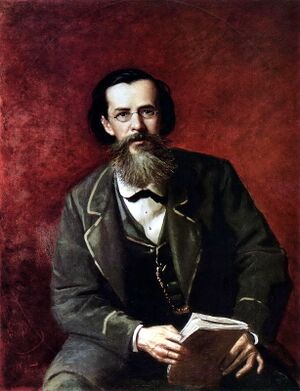Letter 4501 and Apollon Maykov: Difference between pages
m (1 revision imported) |
|||
| Line 1: | Line 1: | ||
{{ | {{picture|file=Apollon Maykov.jpg|caption='''Apollon Maykov''' (1821-1897), in an 1872 portrait by Vasily Perov (1833–1882)}} | ||
| | Russian poet and translator (b. 23 May/4 June 1821 in [[Moscow]]; d. 8/20 March 1897 in [[Saint Petersburg]]), born '''''Apollon Nikolayevich Maykov''''' (Аполлон Николаевич Майков). | ||
| | |||
}} | |||
==Tchaikovsky's Settings of Works by Maykov== | |||
Tchaikovsky used two poems from Maykov's collection ''Modern Greek Songs'' (Новогречиские песни), published in 1860, in his [[Six Romances, Op. 16]] (1873): | |||
* No. 1, ''Cradle Song'' (Колыбельная песня), after the poem of the same name. | |||
* No. 6, ''Modern Greek Song'' (Новогреческая песня), from an untitled poem in the collection <ref name="note1"/>. | |||
Maykov also provided the text for Tchaikovsky's cantata ''[[Moscow (cantata)|Moscow]]'', written for the coronation celebrations of Tsar [[Alexander III]] in 1883. Seven years later, in a letter to the [[Grand Duke Konstantin Konstantinovich]], Tchaikovsky recalled: | |||
[[ | {{quote|Regarding ''[[Maykov]]'', I remember how it fell to me to write a ''Coronation Cantata'' on his text. At the time I was staying in [[Paris]]... Suddenly I received a proposal, already declined by [[A. G. Rubinstein]], to write a ''Coronation Cantata'' in two weeks... I considered that to carry out such a proposition was impossible within such an outrageously short time scale, and gave vent to my feelings to my brother [[Modest]], who at that time happened to have to hand a book of [[Maykov]]'s verses; my admiration for these was such that they involuntarily stirred my inspiration, and so that I would not forget, I wrote on the book in pencil the musical ideas that had come into my head. Had this not happened then there probably have been no Coronation Cantata, but under the spell of this magic the cantata was ready and dispatched in time, and I consider it to be among the best of my compositions <ref name="note2"/>.}} | ||
==External Links== | |||
* [[Wikipedia:Apollon Maykov|Wikipedia]] | |||
==Notes and References== | ==Notes and References== | ||
<references> | <references> | ||
<ref name="note1"> | <ref name="note1">On the autograph and many of the printed editions, the words of No. 2 from this set —''Wait!'' (Погоди!) — are mistakenly attributed to Maykov, but are actually by [[Nikolay Grekov]].</ref> | ||
<ref name="note2">[[Letter 4114]] to [[Grand Duke Konstantin Konstantinovich]], 18/30 May 1890.</ref> | |||
</references> | </references> | ||
[[Category:People|Maykov, Apollon ]] | |||
[[Category:Writers|Maykov, Apollon ]] | |||
[[Category:Translators|Maykov, Apollon ]] | |||
Revision as of 21:18, 25 December 2022
Russian poet and translator (b. 23 May/4 June 1821 in Moscow; d. 8/20 March 1897 in Saint Petersburg), born Apollon Nikolayevich Maykov (Аполлон Николаевич Майков).
Tchaikovsky's Settings of Works by Maykov
Tchaikovsky used two poems from Maykov's collection Modern Greek Songs (Новогречиские песни), published in 1860, in his Six Romances, Op. 16 (1873):
- No. 1, Cradle Song (Колыбельная песня), after the poem of the same name.
- No. 6, Modern Greek Song (Новогреческая песня), from an untitled poem in the collection [1].
Maykov also provided the text for Tchaikovsky's cantata Moscow, written for the coronation celebrations of Tsar Alexander III in 1883. Seven years later, in a letter to the Grand Duke Konstantin Konstantinovich, Tchaikovsky recalled:
Regarding Maykov, I remember how it fell to me to write a Coronation Cantata on his text. At the time I was staying in Paris... Suddenly I received a proposal, already declined by A. G. Rubinstein, to write a Coronation Cantata in two weeks... I considered that to carry out such a proposition was impossible within such an outrageously short time scale, and gave vent to my feelings to my brother Modest, who at that time happened to have to hand a book of Maykov's verses; my admiration for these was such that they involuntarily stirred my inspiration, and so that I would not forget, I wrote on the book in pencil the musical ideas that had come into my head. Had this not happened then there probably have been no Coronation Cantata, but under the spell of this magic the cantata was ready and dispatched in time, and I consider it to be among the best of my compositions [2].
External Links
Notes and References
- ↑ On the autograph and many of the printed editions, the words of No. 2 from this set —Wait! (Погоди!) — are mistakenly attributed to Maykov, but are actually by Nikolay Grekov.
- ↑ Letter 4114 to Grand Duke Konstantin Konstantinovich, 18/30 May 1890.

